Discovering Dubai's Local Markets: A Cultural Journey
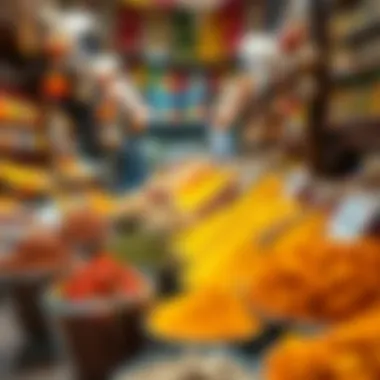
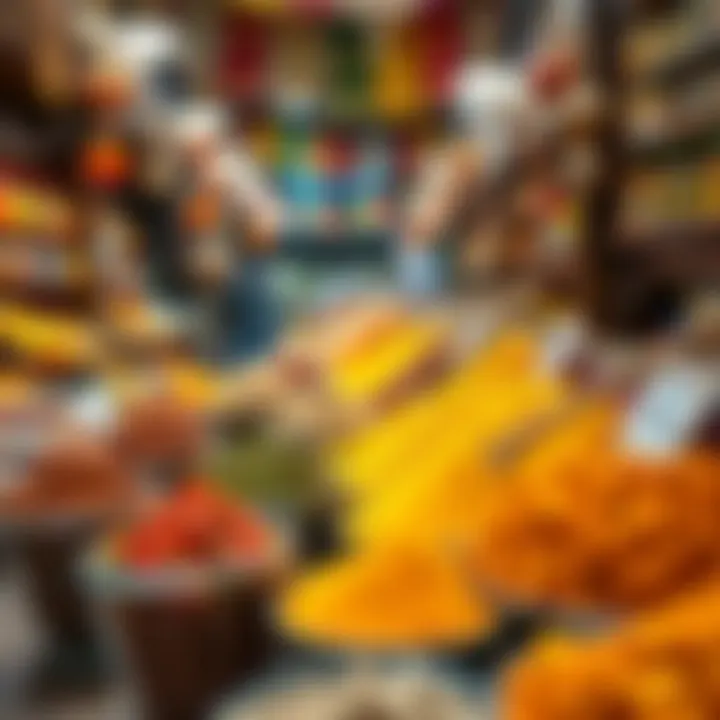
Intro
Dubai, a dazzling jewel in the Middle Eastern crown, is not just about towering skyscrapers and luxury malls; it’s also home to a series of bustling local markets, or souks. These markets present a vibrant tableau of the city’s history, culture, and economic evolution. For newcomers, expatriates, and investors alike, understanding the soul of these markets provides valuable insight into the city's essence.
The souks of Dubai serve as a microcosm of the broader cultural and commercial landscape, blending the traditional with the contemporary. Visitors can easily lose themselves in the aromatic allure of spices in the Spice Souk, or the shimmering gems and textiles in the Gold Souk. These experiences transcend mere shopping; they offer a lens through which to view the daily life of Dubai’s residents and reflect the city’s deep economic ties to trade and craftsmanship.
Understanding these markets is crucial for investors looking to tap into Dubai’s vibrant economy. The cultural heritage embedded in each souk makes it not just a shopping destination but a critical component of Dubai’s urban identity. From assessing property prices to recognizing investment strategies in the evolving landscape, this article will dissect various aspects surrounding the souks, providing readers with a roadmap for exploration and investment.
As we venture into the rich narrative of Dubai's souks, one will encounter not only a treasure trove of goods, but also a vivid expression of community and commerce that shapes the daily lives of Emiratis and expats alike. Let’s delve deeper into the trends that characterize these lively markets.
Foreword to Dubai's Souks
Dubai's souks, or markets, are more than just places to buy goods; they represent a vibrant tapestry of culture, history, and community. These bustling hubs play a critical role in the social and economic fabric of the city, offering a unique opportunity to immerse oneself in the rich heritage of the region. As more expatriates and investors flock to Dubai, understanding the significance of these souks becomes paramount.
Exploring Dubai's souks can be likened to peeling an onion—every layer reveals something deeper and more enriching. This introduction serves to outline what makes these markets a focal point for both locals and visitors alike. From the exquisite craftsmanship found in the Gold Souk to the intoxicating aromas wafting from the Spice Souk, the choices are boundless. In these souks, one may find not only goods but the essence of Dubai’s identity.
Definition and Purpose
The term "souks" generally refers to traditional marketplaces or bazaars found in Arabic-speaking countries. In Dubai, these souks fulfill several purposes. They are commercial centers, cultural gathering spots, and historical landmarks all rolled into one. Here, one can witness the age-old trading practices that have persisted through time, offering an authentic glimpse into Arabian culture.
The essential purpose of these souks goes beyond mere commerce. They act as a barometer for local craftsmanship and trade behaviors, reflecting the tastes and needs of the community. Each item sold has a story to tell, steeped in local traditions and practices.
A Brief Historical Context
To understand the contemporary significance of Dubai's souks, it is important to look back at their historical roots. Traditionally, Dubai was a trading hub, attracting merchants from across the Middle East and beyond. The Gold Souk, for instance, has played a pivotal role since the 1940s, serving as a point where international gold traders converged.
Along the winding alleyways of these markets, the spirit of trade has always flourished. The unique architecture, with its wind towers and wooden beams, echoes a time when Dubai was a modest fishing village. As the economy transitioned from pearls to oil, the souks adapted, yet retained their core function as meeting places for merchants and communities. The juxtaposition of old and new is striking, where modern buildings loom nearby but the essence of trade remains unchanged.
In summary, the souks of Dubai offer a deliberate mix of history, culture, and commerce, all while setting the stage for the city's future as an international hub.
Types of Souks in Dubai
The souks of Dubai stand as a vibrant expression of the city’s general essence, showcasing cultural diversity, rich traditions, and local craftsmanship. Understanding the different types of souks is crucial not just for tourists, but for investors and expatriates who are settling into Dubai. Each souk offers a unique experience, serving various niches of locals and visitors alike.
From glistening gold to fragrant spices, these markets embody the spirit of exchange and the intermingling of cultures. Walking through the souks is like flipping through the pages of history, while also hinting at the modern dynamics of commerce in the region. Here, we explore some notable souks, providing potential economic insights and showcasing the benefits of engaging with these local markets.
The Traditional Gold Souk
The Traditional Gold Souk is a must-visit for anyone hoping to gain an appreciation for the exquisite craftsmanship and artistry that goes into gold jewelry. Situated in the heart of Dubai’s commercial district, this souk is often bustling with both seasoned locals and tourists. The allure of this market lies in the sheer variety of gold designs available, ranging from the intricate to the bold. Shoppers can expect to see pieces adorned with precious stones, showcasing cultural heritage.
Apart from the visual appeal, the Gold Souk serves as a barometer for gold prices, influencing trends and economics in the larger market. There’s an unspoken camaraderie among visitors and shop owners, stemming from the shared experience of negotiation and the genuine interest in craftsmanship.
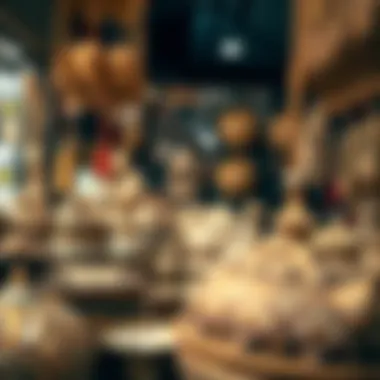
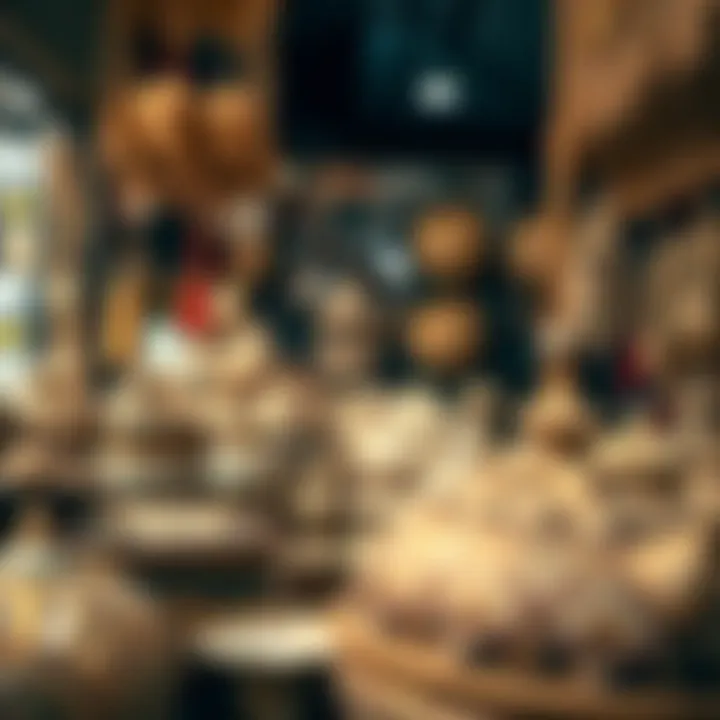
The Spice Souk Experience
The Spice Souk offers a sensory overload, bursting with colors and aromas that could awaken the most dormant senses. Located adjacent to the Gold Souk, it offers an exotic blend of spices, herbs, and flavors from around the world. The experience here transcends mere shopping; it’s about embracing the culinary traditions of the region.
Visitors are often greeted by friendly vendors eager to share their knowledge about spice combinations, improving one’s kitchen repertoire. Not only does this souk provide an opportunity for consumers to buy fresh spices, but it also enhances the understanding of local cuisine. Furthermore, traders are quite accustomed to haggling, which adds an engaging layer to the shopping experience.
Textiles and Fabrics in the Souks
Textiles in the souks are nothing short of captivating. Colorful fabrics flow through the aisles, showcasing a plethora of patterns and textures that often reflect Dubai’s cultural heritage. Spending an afternoon in this vibrant space unveils a treasure trove of silk, cotton, and wool, with each piece telling a story of its origin.
Here, shoppers can find everything from traditional garments like abayas and kandooras to luxurious cushion covers and table linens. Investors might notice a growing trend in sustainable materials being offered as the market adapts to global concerns regarding environmental impact. This transition presents opportunities for partnerships and investment within the fabric supply chain, marrying local craftsmanship with eco-consciousness.
Perfume Souk: A Step into Tradition
The Perfume Souk is an intimate exploration of scents that have defined cultures and personal identities. Nestled in Deira, this souk is home to an array of fragrance shops, each emitting captivating aromas that beckon customers to step inside. Many sellers specialize in traditional Arabic perfumes, made from natural oils and essences, allowing for a unique olfactory experience.
What makes the experience truly special is the chance to create a custom blend, a personal touch that resonates with both locals and expatriates. Crafting a fragrance becomes much more than a transaction; it evolves into a personalized encounter with local artistry. Expatriates may find a sense of home in these scents, making this souk indispensable for cultural integration.
Bur Dubai and Deira Souks
The souks of Bur Dubai and Deira serve as historical marketplaces, where old-world charm meets modern-day commerce. These districts are akin to a living museum, portraying Dubai's transformation over time. The buildings themselves reflect ancient architecture, which adds to the richness of the browsing experience.
Both areas are interconnected, offering visits a unique chance to explore a variety of goods, from handmade crafts to electronics. For investors and homeowners, the commercial trends in these areas are essential to monitor, particularly as new developments continue to reshape Dubai’s retail landscape. Emerging brands are quickly establishing themselves, moving into areas once dominated by traditional crafts.
The charm of Bur Dubai and Deira lies in their vibrant atmosphere, combining the nostalgia of the past with the conveniences of the present. It’s a reminder that amidst rapidly growing skyscrapers, the soul of the city still thrives here, inviting you to discover the depths of its architecture and culture.
The Cultural Significance of Souks
Dubai’s souks are much more than mere marketplaces; they serve as vital arteries in the city's social and cultural fabric. They reflect the land’s heritage, showcasing traditions that have been nurtured over centuries. The blend of culture, commerce, and community affirms why these souks hold a significant place in the hearts of many.
A Meeting Place for Communities
Souks have always been bustling with life, acting as a crossroads where communities gather. This is where locals and visitors mingle, trade stories, and exchange goods, forging relationships in the process. Here, conversations flow as freely as the fragrant spices for sale; the atmosphere is electric with the buzz of diverse languages and cultures.
- Social Interactions: People of different backgrounds come together, breaking down barriers. The exchange of greetings, bargaining banter, and shared experiences foster connections that enrich local life.
- Community Events: Many local events and festivals often take place within or nearby the souks, brining together families and friends. It’s common to find art exhibits, cultural performances, and food festivals celebrating traditional Emirati culture.
- Networking Opportunities: For expatriates and investors, these spaces can also be fertile ground for networking, often leading to unexpected partnerships and friendships.
Souks are woven into the lives of many, facilitating a sense of belonging and community that transcends mere shopping.
Preservation of Heritage
The role of souks in preserving cultural heritage cannot be overstated. As Dubai evolves into a global metropolis, these markets stand as testaments to the city’s history and the traditions that shaped it.
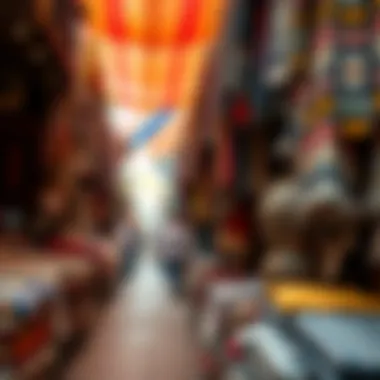
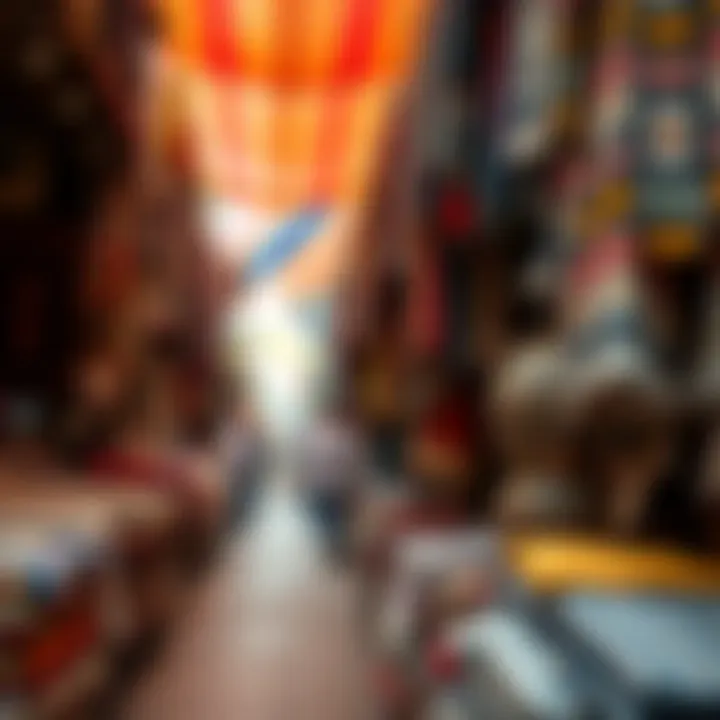
- Craftsmanship: Many stalls showcase handmade goods — from intricate gold jewelry to handcrafted textiles — embodying the skills passed down through generations. Opening a shop in a souk often means stepping into a lineage of artisanry that honors the past while embracing modernity.
- Cultural Practices: The souks are crucial in keeping traditional practices alive. From bargaining techniques to traditional recipes using spices sold at the Spice Souk, these evocative experiences connect people to their roots.
- Educational Opportunities: Visitors can learn about local culture through guided tours and workshops offered at souks. Such initiatives allow local artisans to share their craft, ensuring that age-old techniques endure amid the fast-paced development of the modern world.
"Through seeing and having firsthand experiences in these markets, expatriates and newcomers can really tap into the heartbeat of Dubai’s cultural narrative."
In essence, the souks are living museums; they embody the synergy of past and present, establishing a cultural identity that is distinctly Emirati. They allow one to touch the thread of history while being woven into the vibrant tapestry of today’s Dubai.
Economic Impact of Local Markets
Dubai’s souks do more than just offer trinkets and spices; they are central to the city’s economy, reflecting both the local culture and the global marketplace. Their economic significance extends beyond mere sales figures, as these vibrant markets serve as a crucial artery for employment and tourism. Understanding this economic impact is key for anyone considering investing in or engaging with the local market scene.
Role in Local Employment
The employment landscape in Dubai is intricately linked to its souks. These markets provide countless job opportunities for both locals and expatriates. The hustle and bustle of each souk requires a diverse workforce ranging from sales associates to artisans and tradespeople.
- Diverse Job Opportunities: The varied nature of products sold means different skill sets are valued. In the Gold Souk, for instance, you’ll find goldsmiths and jewelers crafting intricate designs, while the Spice Souk demands knowledgeable vendors to educate customers about a plethora of spices.
- Entrepreneurial Ventures: Many individuals start small businesses within the souks, creating a vibrant entrepreneurial environment. Street vendors, for example, may begin with a single cart and grow into a well-known local brand.
- Skill Development: Employment in the souks often comes with hands-on experience that enhances skills like negotiation, customer service, and product knowledge, essential traits in any job market.
The role of local markets as employment hubs not only reduces unemployment rates but also fosters a sense of community. When individuals earn a living in these markets, they often invest their income back into the community, creating a cycle of economic benefit.
Contribution to Tourism
Dubai's souks are a major draw for tourists. These markets not only showcase traditional crafts but also offer unique experiences that tourists seek.
- Cultural Experience: Visitors flock to the souks seeking authenticity, wanting to immerse themselves in the local way of life. Engaging with vendors, asking questions, and purchasing local goods create a memorable experience.
- Attractive Shopping Destinations: The souks are integral to Dubai’s charm. Tourists enjoy the art of bargaining and the colorful displays of goods. The aroma of spices in the Spice Souk or the glimmer of gold in the Gold Souk is something that cannot be replicated in a modern shopping mall.
- Boosting Ancillary Services: Increased tourism leads to more foot traffic, which benefits nearby cafes, restaurants, and hotels. As visitors come to engage with the souks, they also support the broader economy.
"The souks are not just markets; they are gateways to understanding the rich tapestry of Dubai’s heritage and economy."
Shopping Experience in Dubai's Souks
The shopping experience in Dubai's souks is a vibrant blend of tradition and modernity. Local markets, or souks, are not just places to buy goods; they encapsulate the rich cultural heritage and economic dynamics of the city. From the moment you enter a souk, you are enveloped in a kaleidoscope of sights, sounds, and scents that stimulate your senses.
One of the primary ilusions of visiting these markets is the opportunity for personal interaction. Unlike the monotonous environment of high-end shopping malls, souks offer a tapestry of human connections. Vendors are usually more than willing to engage in conversations, sharing stories about their products, backgrounds, and even the latest gossip. Consequently, shopping becomes a lot more than a simple transaction; it’s an exchange of experiences, an immersion into the local culture.
Moreover, the diversity of goods available in Dubai's souks is simply staggering. You can find just about anything, from exotic spices to handcrafted jewelry. Shoppers benefit from this variety, enabling them to explore local craftsmanship while enjoying prices that often beat those of traditional retail outlets. This unique aspect makes the shopping experience in the souks not just about buying, but also about exploration and discovery.
Tips for Negotiation
Negotiation is a vital part of the shopping experience in the souks. This practice is not only accepted but often expected. Here are some tips to help you navigate the art of bargaining:
- Know Your Worth: Understanding the approximate price range for the item you wish to purchase can give you an advantage.
- Start Low: Initiate the negotiation with a price that is notably lower than what you’re willing to pay. This opens the door for friendly back-and-forth bargaining.
- Be Polite: A friendly approach can go a long way. A smile and a little laughter can break the ice and create rapport with the vendor.
- Know When to Walk Away: If a seller is unwilling to meet your price, don't hesitate to walk away. Oftentimes, this might prompt them to reconsider and offer you a better deal.
Understanding Local Customs
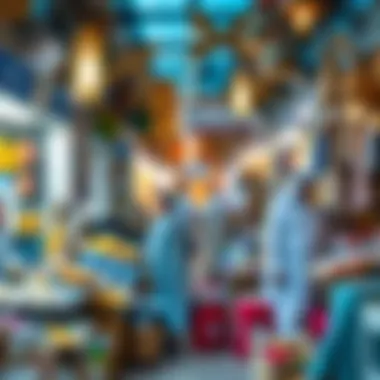
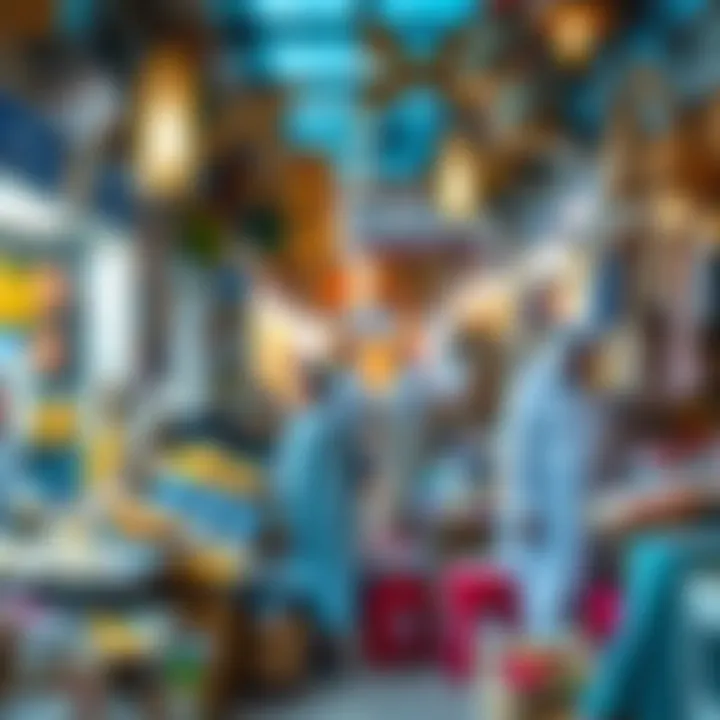
Buying from a souk often requires awareness of local customs and etiquette. Here are some pointers:
- Dress Modestly: It’s essential to respect the local culture by dressing appropriately. This sets a positive tone for your interactions with vendors.
- Greetings Matter: A simple "Salam Alaikum" (peace be upon you) can make a significant difference in your shopping experience, reflecting respect for local customs.
- Cash is King: While cards are becoming more common, carrying cash is advisable as many sellers prefer cash transactions. It can also aid in negotiations, allowing you to broaden your bargaining reach.
The shopping experience in Dubai's souks is less about consumerism and more about cultural engagement, making it a memorable activity for anyone visiting the city.
In essence, navigating the souks of Dubai isn't merely about acquiring goods; it’s about immersing oneself in a rich cultural experience that appeals to the senses and fosters human connection.
Contemporary Developments in Local Markets
In recent years, the landscape of Dubai's local markets has been evolving at a breakneck pace. The transformation is not just aesthetic; it incorporates technological innovations and sustainability practices that mark a departure from traditional methods. For investors and expatriates keen on understanding Dubai's economic future, recognizing these contemporary developments is crucial. They bridge the gap between heritage and modernity, ensuring that these markets remain relevant in an increasingly digital world.
Integration of Technology
The integration of technology within Dubai's souks has significantly reshaped the shopping experience. Gone are the days where one would haggle for hours without any digital aids. Today, smart payment systems and mobile apps have simplified transactions. For instance, merchants are embracing mobile point-of-sale systems. This allows even small vendors to accept card payments, turning tourists' spontaneous purchases into seamless transactions.
Additionally, some markets are utilizing augmented reality to enhance customer interactions. Imagine walking through the Gold Souk and getting details about a jewelry piece through a smartphone app. Such innovations not only streamline operations but also attract a tech-savvy clientele.
As Dubai looks to position itself as a global tech hub, the souks are reflecting this ambition. Investors will find it essential to note these changes, as technology integration may drive new consumer behaviors and preferences.
Sustainability in Souks
Sustainability has taken center stage in the discussion about local markets. Traditionally, environmental considerations may have been overlooked amidst the bustling activity of barter and trade. However, there's a growing awareness among both consumers and sellers about the source of goods and their environmental impact. Markets such as the Fresh Fish Market have begun shifting toward sustainable sourcing practices. Vendors now often highlight eco-friendly options, catering to a more environmentally conscious customer base.
Moreover, initiatives encouraging reduced plastic use are pioneering in the textile and spice souks. Vendors are often seen offering fabric bags and packaging alternatives instead of single-use plastics. This shift not only benefits the environment, but it also appeals to the growing demographic that prioritizes sustainable living.
"Sustainable trade practices in Dubai's souks are not merely a trend but a mindful evolution of the shopping culture."
For investors and newcomers, these considerations are vital. As consumer preferences deepen towards sustainability, local markets that adopt these practices might see enhanced loyalty and business growth.
In summary, the contemporary developments in Dubai's local markets are not just about keeping up with global trends; they also represent a proactive approach to shaping a more resilient and future-ready marketplace. Understanding these dynamics will help expatriates and investors navigate the intricacies of Dubai's vibrant souks, ensuring they remain engaged with the ever-evolving cultural and economic landscape.
End: The Timeless Appeal of Dubai's Souks
As we wrap up our exploration of Dubai's souks, it becomes clear that these bustling markets are not just places to shop; they encapsulate the heartbeat of the city. The vibrant atmosphere, intricate designs, and rich aromas create an experience that is hard to replicate elsewhere. Above all, the timeless appeal of the souks lies in their ability to blend tradition with modernity. This characteristic is especially valuable for investors and newcomers who seek to understand the cultural fabric of Dubai.
The essence of Dubai’s souks is deeply rooted in the heritage the city shares with its past, reflecting stories of trade, community, and craftsmanship that continue to thrive. From the Gold Souk, gleaming with valuable treasures, to the Spice Souk, where diverse flavors dance through the air, each market offers a slice of life that depicts Dubai's vibrant mosaic.
Moreover, the economic implications cannot be overlooked.
- Local Employment: Souks provide significant job opportunities, enhancing the local economy.
- Tourism Attraction: Tourists flock to these markets not only for shopping but for the authenticity they offer. This sustains a cyclical benefit, as tourists spend money, thus fueling the economy further.
"In Dubai's souks, every purchase is more than just a transaction; it's a story woven into the fabric of the city."
As we look ahead, amidst the rapid development of Dubai, it’s important to note the resilience of these markets. Their survival and adaptation to contemporary demands highlight their significance in the broader economic landscape. Investors and developers must, therefore, be attentive to the evolution of souks, considering how modern retail practices can coexist with traditional ones.
Looking Ahead: Future of Local Markets
In considering the future, we see a few highlights that should be on the radar of anyone interested in the local markets of Dubai:
- Technological Integration: The use of e-commerce platforms to complement physical shopping experiences can broaden the reach of local artisans and vendors. As digital commerce rises, the fusion of traditional and modern commerce becomes ever more critical. Collaborations between tech firms and souk vendors could lead to innovative solutions for marketing and sales.
- Sustainable Practices: With an increase in environmental awareness, souks are beginning to embrace sustainability. Vendors offering eco-friendly products or practices can attract a conscientious consumer base, assuring their appeal in an evolving market environment. Supporting local artisans who utilize sustainable methods contributes to a more ethical market.
- Community Engagement: The role of souks as community hubs will continue to evolve, where workshops, cultural events, and traditional performances can enhance the shopping experience. Encouraging locals and expatriates to engage ensures that the souks remain central to the identity of Dubai.



